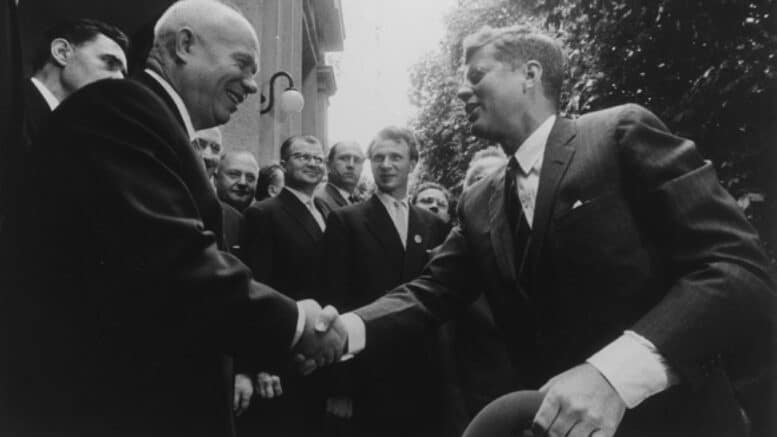The following bilingual Russian MiniLesson is meant to build your vocabulary by providing Russian phrases within English text. Hover over the bold Russian to reveal its English translation.
Холодная войнаThe Cold War was a геополитическая, военная, экономическая, и идеологическая конфронтацияgeopolitical, military, economic, and ideological confrontation between the Советский Союз и его союзникиSoviet Union and its allies on one side, and США и их союзникиthe USA and its allies on the other. It is generally regarded as having lasted from 1946 until the end of 1991, when the USSR fell.
The Cold War in Russia is understood has having had several periods: период эскалацииthe escalation period from 1953-1962; достижение стратегического паритета, разрядкаreaching strategic parity, détente from 1963-1978; and Вторая Холодная Войнаthe Second Cold War from 1979-1985. РазрядкаDétente was caused by сотрудничество между США и СССРcooperation between the US and USSR, such as переговоры об ограничении стратегических вооружений – ОСВStrategic Arms Limitation Talks - SALT. Détente ended in 1979 when the СССР ввел войска в АфганистанUSSR deployed troops in Afghanistan. That marked the beginning of the Вторая Холодная Война.Second Cold War
Напряжение было всегда высокимTensions were always high during the Cold War. The самые драматичные событияmost dramatic events of the Cold War were Берлинский кризис 1961 годаBerlin Crisis of 1961, Кубинский ракетный кризисthe Cuban Missile Crisis, which is better known in Russia as Карибский кризисthe Caribbean Crisis, столкновения между советскими и американскими военнымиclashes between the Soviet and American military during война в Корееthe Korean War and война во ВьетнамеVietnam War. Инцидент с корейским Боингом 747the Korean Airlines Boeing 747 Incident, in which a passenger plane was shot down over Soviet airspace in 1983, обострил отношенияaggravated relations between the USSR and the West.
Космическая гонка the Space Race, from 1955-1975, was an example of соперничество в области освоения космосаrivalry in space exploration that also marked the Cold War. In addition to having большое значение для научных и военных разработокmajor significance for scientific and military developments, space exploration had a пропагандистский эффектpropaganda effect in both countries. The USSR was the first to запустить искусственный спутник Землиlaunch an artificial satellite from Earth on October 4, 1957, and to отправить в космос человекаsend a man to space in 1961. The USA later опередилиovertook the USSR in высадка на Лунуlanding on the Moon.
One of the factors that helped предотвращать войнуprevent war was взаимное гарантированное уничтожениеmutually assured destruction. Each side had nuclear weapons в количестве, достаточном для уничтожения другойsufficient to destroy the other, which делает бессмысленными любые попытки применения доктрины Первого удараmakes any attempt to implement the First Attack Doctrine useless.
The Cold War resulted in the железный занавесIron Curtain, an информационный, политический, и пограничный барьерinformation, political, and geographic barrier that separated the СССР и другие страны социалистического блокаUSSR and other Eastern Block countries from the Западный мирWestern world.
As technology advanced, so did the opportunity for potentially fatal mistakes. Ошибки компьютераcomputer glitches, such as the 1979 NORAD Computer Glitch and the 1983 Nuclear False Alarm, brought the world на грань ядерной войныto the brink of nuclear war based on false information. Хотя технологии ядерного мониторинга улучшились в определенных аспектах,while nuclear monitoring technology has improved somewhat in certain aspects вероятность технических ошибок все еще остаётсяthe possibility of technical errors still remains.
Anytime that major geopolitical tensions exist, especially between heavily armed parties with multiple alliances, any small misunderstanding or mistake can result in potentially disastrous events that can affect millions of innocent lives.



